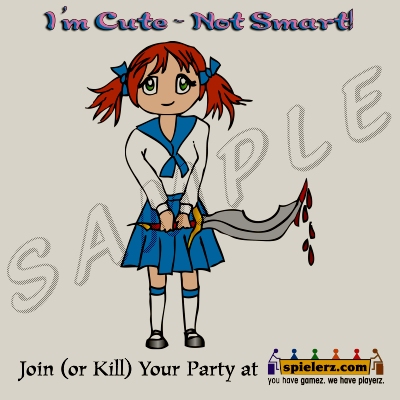If you haven’t yet, go read the first part of this series.
So now for some context. I was contacted by a representative from Spielerz.com not so long ago about me writing a promotion post for their site in order to try to generate interest with a female audience. So I, not willing to promote something without first knowing if what I was promoting would be a good community for my readers, asked some questions.
As part of the response, the representative linked me to the T-shirt design from the previous post. She did this in the interest of full disclosure, and I’m glad she did. From there ensued a small discussion on the shirt and I found that I was interested in critiquing it, and moreover that I was presented with the rare opportunity to get an explanation from the designer, a friend of said representative.
So, I asked if the designer would write up her reasoning behind the design and here’s what she wrote:
So, the idea behind this shirt was inspired by my friend who is very cute and very smart. She says “I’m cute, not smart” whenever she has missed something obvious or made a mistake of some sort. This always gets a laugh because, well, it’s funny and anyone who knows her is well aware of her intelligence (she recently earned a full scholarship to law school and is working toward her goal of becoming a judge).
She is also a gamer – she plays RPGs – and in one notable Call of Cthulhu game, her character went insane and killed the entire party. So, using that idea I made the very cute character (who resembles my friend) quoting her saying after having presumably wiped out her fellow adventurers.The intentions behind this shirt aren’t to degrade women in any way, or to perpetuate any negative stereotypes. For example, I chose not to give the character blonde hair, because the “dumb blonde” stereotype annoys me to no end and I did not want the shirt to be another blonde joke. It is more subtle than that. The fact is, some women (and men) are cute, but not smart, and some are both or neither – people shouldn’t be judged on gender or looks and I would love to live in a world where they weren’t. But reality is that humans classify, compare and judge others, and so there is a stereotype in our society that “pretty” girls lack intelligence. Some women play to this idea to get what they want, others fight it, others ignore it and some are it. I’ve found that smart women tend to like this shirt because it pokes fun at the stereotype – it says that the “cute” girl could be playing dumb so you won’t know that she’s a force to be reckoned with till it’s too late, or that the girl who’s “not smart” shouldn’t be written off.
So, now, fully armed with context, what do you think of the shirt? I’ll put it behind the cut for those who want to refresh their memories. Continue reading





